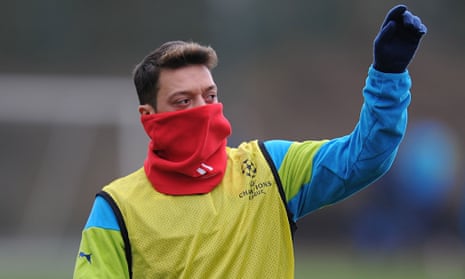To put it into context, the cold, harsh reality for Arsenal is that no team have ever qualified in the Champion League era after losing the home leg of a knockout tie by more than one goal and needing to score at least twice, never mind the three or more that Arsène Wenger’s men will need to stand any chance of turning their tie against Monaco upside down.
They will also have to contend with a Monaco side unbeaten in 16 matches, who have a better defensive record than Paris-Saint Germain and everyone else in Ligue 1 and did not concede a single goal in their three group games at Stade Louis II. Arsenal have kept only three clean sheets in their last 31 foreign excursions in this competition and when their delayed flight finally got Wenger into his old workplace he was reminded that Monaco had won 75% of their Champions League assignments at this ground. Only Real Madrid have a better win percentage at home. “The statistics are all against us,” Wenger said. “We have to give everything to make the statistics lie.”
Can they do it? Well, it might be easier to feel positive on their behalf if it were not for that slightly awkward moment at Arsenal’s press conference when Per Mertesacker, one of the culprits from that wretched 3-1 first-leg defeat, admitted almost in passing they had done so badly a fortnight ago because “we weren’t really up for it mentally”.
If Arsenal’s players could not rouse themselves for a Champions League night, under the floodlights at the Emirates, with a quarter-final place as the prize, it does raise legitimate questions about why not, and whether Wenger’s men can be trusted fully just because they say it will be different this time.
Mertesacker had talked of needing a miracle after the first leg and three weeks later his best attempts to sound positive simply confirmed the impression Arsenal still have a soft centre. “At times, we could feel there was a bit of a pressure and we couldn’t cope,” he said. In fairness, he did go on to say Arsenal had shaken it out of their system, winning every game since.
Monaco’s win in London was described by L’Equipe as “one of the greatest Champions League performances by a French club”. Their coach, Leonardo Jardim, followed that up here by describing it “a dream game, the perfect performance” and on the plus side for Arsenal that does leave the suspicion that les Monégasques might struggle to play so well again.
All the same, Wenger accepted it would need “the greatest performance” if his team were to break that run of four successive seasons when they have been eliminated at the first knockout stage. For starters, Olivier Giroud, awarded two out of 10 in L’Equipe’s ratings after the first leg, cannot be as generous again with his finishing. “He owes it to himself as revenge,” Wenger said.
He pointed out Arsenal had more chances than people might remember in the opening game and, without wishing to underestimate France’s fourth-placed team, it should not be forgotten Monaco put together only eight passes in the first eight minutes. More worryingly for Arsenal, Jardim had noted Wenger’s side do not usually excel over a full game, often deteriorating in the second half.
The onus on Arsenal is to be ambitious from the start but they also have to make sure the structure of the team is not lost and Mertesacker, as the senior defender, needs to help restore the organisation so badly missing in that first-leg capitulation.
“We have to cope with difficulties and criticism in our job but we have a good chance to repair that,” the German said. “We want to do better, we must make better decisions. We did things wrong, obviously. Can we learn from that and put in another performance? That is not going to be easy but we would like to show a different face of Arsenal.”
Wenger looked and sounded confident on his return to Monaco, full of levity and wishing everyone a good night in the casino before accepting a framed photograph from the club’s directors. Yet the story of his team chasing first-leg deficits has become a recurring theme of their Champions League story. So far it has ended every time with them leaving the competition but there is a history of this kind of comeback happening before, back in the days when the competition was just the straightforward European Cup.
In 1969, Ajax lost 3-1 at home to Benfica. They won the return game by the same score at Estádio da Luz. Johan Cruyff scored twice and he was also on target in a 3-0 win in the playoff, with the Dutch team getting all their goals in extra time. Ajax reached the final that year. Yet Arsenal are 80-1 to win this season’s competition.
